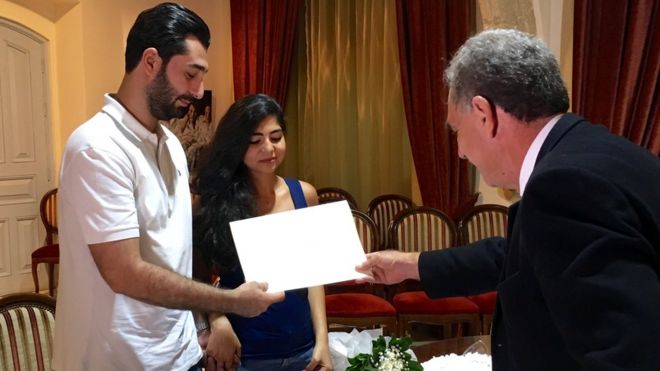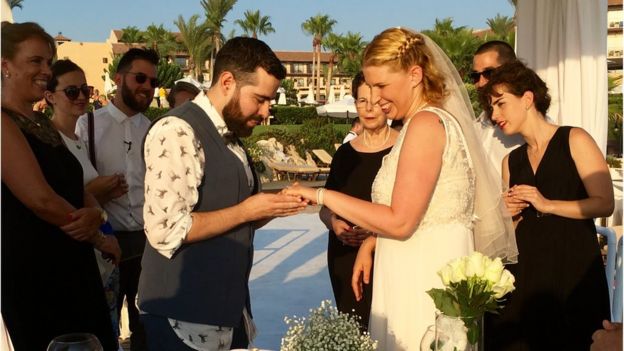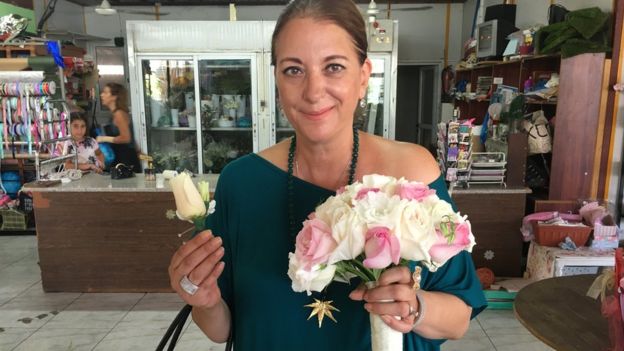
Every year, 3,000 couples fly from the Middle East to Cyprus to get married. It's the easiest place to go if they want a civil ceremony rather than a religious one.
A cheesy love song blares out from tinny speakers as a young couple nervously walk hand-in-hand past rows of empty seats in the Larnaca civil wedding hall.
Rachelle and Abdul Kader (pictured above) are Lebanese but they had to come to a foreign country to make the commitment of their lifetimes.
In T-shirts and ripped jeans, the pair aren't dressed as your typical bride and groom and they exchange vows in English rather than their native language, Arabic.
I'm the only witness present to wish them "Mabruk! - Congratulations!" as they are declared man and wife by the registrar, and shyly kiss each other.
Their love story is a common one in Lebanon - a country which has 18 officially recognised religious sects. Rachelle is a Maronite Christian and Abdul Kader is a Sunni Muslim. Neither wants to convert to their partner's religion and they feel that rules out a religious wedding.
"Of course, I would prefer to get married under the name of God, but we had no choice," Rachelle tells me. "We came here since we don't have civil marriage in Lebanon."
 GETTY IMAGES
GETTY IMAGES
An extraordinary number of foreign couples visit Cyprus for their weddings - about 3,000 fly in from the Middle East every year.
Most of them are Lebanese and Israelis. They find a Greek Cypriot civil ceremony is quick and cheap and crucially it's legally recognised at home.
"There are a hell of a lot of people around us who aren't allowed to have civil weddings and we're the first country of Europe they find," says Larnaca civil marriage officer, Michaelakis Mallas.
"Ceremonies take 10 to 15 minutes but we do give them a good show!" he adds.
Michaelakis enjoys his job. "You see a lot of emotion," he says. "And love knows no barriers."
In parts of the Middle East there have been attempts to legalise civil marriage but religious leaders have used their political influence to block them.
Some countries simply impose Islamic or Sharia law but others have set-ups rooted in Ottoman times. These allow different religious communities to operate their own courts and parallel systems of family law.
So imams, priests and rabbis control marriage, divorce, child custody and inheritance. They argue that God sees all and religion cannot be separated from these aspects of a person's life.
Along the Cypriot coast in Pathos, foamy waves leap around Aphrodite's Rock. This is where the ancient Greeks believed the goddess of love was born and it is a popular wedding location.

At sunset, under a blushing sky, an Israeli couple, Raz and Or, are getting married beneath a cream canopy on a pier. They're secular and insisted on a civil ceremony.
"In Israel, there is only religious marriage so couples have to go to the rabbi," the groom, Raz, explains. "The bride needs special training for being a wife and a ritual bath. It's an orthodox routine and if you don't believe in it, why do it?"
It doesn't matter whether Israeli Jews aren't religious at all, or are from the liberal Reform or Conservative movements in Judaism - their marriages are regulated by the strict Orthodox rabbinate, the top Jewish governing body.
Couples wanting to marry must prove they're truly Jewish - that each is born to a Jewish mother or has officially converted.
And that causes problems for some 350,000 immigrants to Israel from the former Soviet Union who don't meet these exacting standards.
Many of them too head to Cyprus to marry.

Last year, Gal and his Russian-Israeli wife, Masha, exchanged wedding vows in Limassol, next to the beach.
"It felt strange at the beginning as we're used to a Jewish ceremony," Gal says. "But this was professional - not like marrying in Vegas with an Elvis Presley lookalike."
The couple hope for legal changes in Israel. Otherwise, they say, their baby - due any day now - might also have to marry abroad when he or she grows up.
But for now, Cyprus is cashing in, marketing itself as '"The Island of Love".
The foreign wedding industry is worth $135m (£100m) a year to the Greek Cypriot economy.
At the Larnaca wedding hall, I take a few photos for the mixed-faith Lebanese newlyweds, Rachelle and Abdul Kader. They are planning a big party back in Beirut.
Abdul Kader says he and his wife have made compromises. Now it's time for the Lebanese authorities to do the same - and finally allow civil marriages.
No comments:
Post a Comment